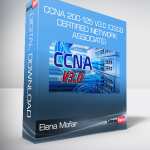Elena Mofar – CCNA 200-125 v3.0 (Cisco Certified Network Associate)
Original price was: $139.00.$27.00Current price is: $27.00.
Who should enroll:
This course is designed for students with zero knowledge/no network background.
How about hands-on activities?
- Description
- Reviews (0)
Description
Elena Mofar – CCNA 200-125 v3.0 (Cisco Certified Network Associate)
The most in-depth CCNA Training you’ll ever find! Pass your CCNA Exam with confidence with this course!
This course is created with only one goal in mind: “TO BE THE ONLY TRAINING RESOURCE YOU’LL EVER NEED TO PASS YOUR CCNA EXAM”
This course is self-paced, and can be accessed anytime, anywhere on any device!
All Hands-on Exercises Would use Packet Tracer and GNS3.
100++ Hours of Training
Language of Delivery: Filipino – English
What is covered:
This course covers everything in the CCNA curriculum. It fully covers CCNA Modules 1 – 4.
Who should enroll:
This course is designed for students with zero knowledge/no network background.
How about hands-on activities?
All hands-on exercises would use GNS3 and Packet Tracer.
These are network simulators that would be installed in your computer for you to be able to configure Cisco routers and Switches at home. It will also enable you to virtualize different network scenarios, and topology that would surely enhance your skills in configuring Cisco devices.
System Requirements for GNS3 and Packet Tracer activities:
1. At least 2Ghz CPU Dual-core
2. At least 2GB RAM
3. Operating System:
> Windows
> Mac OS – You need to have VMWare fusion installed to run Packet Tracer in Mac
Prerequisites:
No prerequisites
Course Inclusions:
1. Certficate of Completion
2. All software and installers are provided inside the course
3. Configuration and Lecture Notes.
4. Lifetime Access
—-
Your Instructor
Elena Mofar
Elena Mofar
Hi, I’m your instructor for this course. I’ve been teaching Cisco and Linux courses for the past 10 years. I am a licensed ECE (Electronics and Communictions Engineer), RHCE (Red Hat Certified Engineer), CCNP and CCNA. And my primary goal in creating courses is for my students to not just learn but to understand how the network works, and to apply them in their jobs. I hope that you’ll find all my courses enlightening as I’ve made all my efforts in them to be so!
Course Curriculum
Course Introduction
Cisco Certification Path (46:39)
How to use this course (4:05)
CCNA 200-125 FILES
Password for Reviewer
Introduction to Networking
Elements of Good Network Design: Cost and LAN Speeds (73:33)
Elements of Good Network Design: WAN Speeds (59:24)
Elements of Good Network Design: Availability (20:33)
Elements of Good Network Design: Reliability scalability security topology (22:25)
Network Topology ( **NEW TOPIC**) (39:56)
Lecture Slides [TO DOWNLOAD]
OSI Layers
OSI Layers Part 1 (12:27)
OSI Layers part 2 (26:51)
OSI LAYERS PART 3 (7:38)
OSI Layers Part 4 (21:43)
Encapsulation and deEncapsulation (27:07)
Lecture Slides [TO DOWNLOAD]
Transport Layer
Features (20:28)
Session Multiplexing (14:33)
Three Way Handshake (27:15)
Segmentation and Sequencing (19:16)
Windowing and Sliding Windows Part 1 (23:43)
Windowing and Sliding Windows Part 2 (17:12)
Encapsulation Roundup (16:17)
Lecture Slides [TO DOWNLOAD]
Physical Layer
EIA/TIA Standards (30:36)
UTP Implementation (16:01)
Ethernet Standards (23:56)
Collision and Broadcast Domains Part 1 (20:15)
Collision and Broadcast Domains Part 2 (19:16)
Collision and Broadcast Domains Part 3 (15:25)
Count how many Collision and Broadcast Domains (19:38)
Lecture Slides (To Download)
L2 and L3 Encapsulations
MAC Address Structure (9:25)
DHCP Encapsulation & Process Part 1 (18:01)
DHCP Encapsulation & Process Part 2 (15:14)
IP Address, Network Address, Broadcast Address (14:27)
ARP Encapsulation & Process (17:22)
The Default Gateway Part 1 (16:34)
The Default Gateway Part 2 (11:54)
How a Router Routes Packets Thru the Internet (21:20)
Lecture Slides (To Download)
Subnetting: Conversions
Binary Introduction (13:45)
Decimal to Binary Conversion (17:37)
Binary to Decimal Conversion (12:43)
Binary to Hexadecimal Conversion (11:31)
Hexadecimal to Decimal Conversion (15:41)
Decimal to Hexadecimal Conversion (18:34)
Conversion Exercises
IPV4 Address Structure
IP Address Classes – Network and Broadcast Address (19:46)
IP Address Classes – Subnet Masks (12:19)
Classes of IP Addresses (19:50)
IPV4 Address Structure Exercises
Subnetting by Network Requirement
Subnetting Requirements (12:47)
Steps 1 and 2 : Getting Network and Number of Bits (11:51)
Step 3 : Get New Subnet Mask (28:17)
Step 4 : Getting Increment (9:27)
Step 5 Part 1 : Getting the New Network Range (8:14)
Step 5 Part 2 : Completing the Range (15:59)
Step 5 Part 3 – When to stop adding increments (16:02)
Getting Actual Networks and Usable Hosts (11:41)
Subnetting b Network Requirement Class B Sample (24:48)
Subnetting by Network Requirement Class A Sample (16:21)
Subnetting by Network Reqt Exercises part 1 (27:09)
Subnetting by Net Reqt Exercises Part 2 (12:30)
Subnetting by Host Requirement
Class C Sample (17:57)
Class B Sample (8:22)
Class A Sample (7:40)
IP Subnet Zero (8:34)
Reserved and Can’t be Assigned Addresses (12:38)
Subnetting by Host Requirement Exercises Part 1 (22:49)
Subnetting by Host Requirement Exerise Part 2 (18:20)
VLSM (Variable Length Subnet Mask)
VLSM Introduction (15:53)
VLSM Sample Part 1 (20:42)
VLSM Sample Part 2 (6:43)
VLSM Exercise (19:30)
VLSM Exercise PDFs
Reverse Subnetting
Reverse Subnetting Scenario 1 (35:39)
Reverse Subnetting Scenario 2 Lecture (24:13)
Reverse Subnetting Scenario 2 Exercises (24:38)
Reverse Subnetting Scenario 3 Lecture (12:26)
Reverse Subnetting Scenario 3 Exercises (7:15)
Reverse Subnetting Scenario 4 Lecture (14:24)
Reverse Subnetting Scenario 4 Exercises (16:44)
Reverse Subnetting – Exception to Subnetting (16:35)
Supernetting
Supernetting Lecture Part 1 (20:03)
Supernetting Lecture Part 2 (22:41)
Supenetting Unequal networks part 1 (22:39)
Supernetting Unequal Networks Part 2 – using shortcut method (17:36)
Supernetting Exercises (16:28)
Supernetting Exercise PDFs
Wildcard Masks
Wildcard Masks Lecture (20:01)
Reverse supernetting with wildcard masks lecture (19:21)
Reverse Subnetting with wildcard masks exercises (19:29)
Wildcard Mask Table
Introduction to Routers
Understanding Router Specifications (40:09)
Router Interfaces and Naming Conventions (41:34)
Connecting Routers to WAN (12:19)
Lecture Slides (To Download)
Lab Simulation Tools
Installing and Using Cisco Packet Tracer (20:29)
How to Install and Use GNS3 (34:28)
General Router Configurations
Checking router connection via CLI (22:28)
Viewing router specifications using CLI (16:20)
Cisco IOS Configuration Modes (13:48)
Configuring Hostname and Enable Password (10:00)
Configuring Line console and Line VTY (24:32)
Encrypting passwords (17:01)
Configuring Banners (9:21)
General Router Configurations Lab Exercise
Configuring Router Interface IP Addresses
Configuring Interface IP Addresses Part 1 (30:24)
Configuring Interface IP Addresses Part 2 (24:04)
How to Telnet and Suspend Telnet Sessions (30:15)
Configuring Loopback IP Addresses (35:34)
Configuring Interface IP Addresses Lab Exercise
Configuration Notes [TO DOWNLOAD]
Introduction to Routing
Introduction to Routing – Lecture (23:53)
Static Routing
Static routing lecture part 1 (22:45)
Static routing lecture part 2 (22:38)
static routing lecture part 3 (25:03)
static routing lecture part 4 (20:16)
static routing lecture part 5 (16:20)
configuring static default routes part 1 (23:09)
configuring static default routes part 2 (20:55)
Static and Default Routing Lab Exercise
Configuration Notes [TO DOWNLOAD]
Routing Protocols
IGP vs EGP (16:24)
Types of routing protocol according to algorithm (34:43)
Lecture Slides (To Download)
RIP (**NEW SECTION**)
RIP Lab Files (PLEASE DOWNLOAD FIRST)
RIP Initial Lab Setup (15:06)
Configuring RIP Part 1 (25:14)
Configuring RIP Part 2 (24:32)
How RIP Works Part 1 (45:08)
How RIP Works Part 2 (39:34)
How RIP Works Part 3 (17:04)
How RIP Works Part 4 (37:57)
How RIP Works Part 5 (20:41)
Configuring RIP Passive Interfaces (33:19)
Troubleshooting RIP (14:37)
EIGRP
EIGRP Initial Lab Setup (20:22)
Configuring EIGRP Part 1 (22:43)
Configuring EIGRP Part 2 (23:21)
Configuring EIGRP Part 3 (13:18)
How EIGRP Works Part 1 (19:03)
How EIGRP Works Part 2 (15:07)
How EIGRP Works Part 3 (12:27)
How EIGRP Works Part 4 (13:19)
How EIGRP Works Part 5 (6:19)
EIGRP Terminologies (24:52)
Viewing the EIGRP Tables (22:56)
Configuring Interface Bandwidths Part 1 (25:46)
Configuring Interface Bandwidths Part 2 (17:38)
EIGRP Unequal-Cost Load Balancing Lecture (28:10)
Configuring Unequal-Cost Load Balancing (10:09)
The No Auto-Summary Effect (26:42)
Configuring EIGRP Passive Interfaces Part 1 (17:50)
Configuring EIGRP Passive Interfaces Part 2 (9:00)
Configuring EIGRP Authentication Part 1 (21:17)
Configuring EIGRP Authentication Part 2 (14:09)
EIGRP Troubleshooting Exercises (12:39)
Troubleshooting EIGRP (22:20)
EIGRP Lab Exercise
TSHOOT LABS
Configuration Notes [TO DOWNLOAD]
OSPF
Configuring Single Area OSPF (28:12)
OSPF Router-ID Lecture (27:59)
Configuring OSPF Router-ID (12:27)
Configuring OSPF Passive Interfaces (18:55)
Configuring OSPF Authentication (27:06)
Establishing OSPF Neighbor Adjacency Part 1 (40:41)
Establishing OSPF Neighbor Adjacency Part 2 (33:14)
Establishing OSPF Neighbor Adjacency Part 3 (18:28)
Establishing OSPF Neighbor Adjacency Part 4 (45:50)
OSPF Areas (54:54)
Multi-Access OSPF (21:18)
Configuring Multi-Area OSPF Lab Setup (7:11)
Configuirng Multi-Area OSPF Part 1 (23:45)
Configuring Multi-Area OSPF Part 2 (22:49)
Configuring Multi-Area OSPF Part 3 (9:45)
Configuring Multi-Area OSPF Lab Part 4 – Default Information Originate (16:08)
OSPF Lab Exercise
Configuration Notes [TO DOWNLOAD]
IPV6
The Need for IPV6 (17:18)
IPV6 Address Structure (6:48)
Abbreviating IPV6 Addresses (16:57)
Determining IPV6 Address Prefix (22:03)
Determining IPV6 Prefix Exercises (11:05)
Types of IPV6 Addresses (8:39)
Link Local IPV6 Address – Getting the EUI-64 Address (12:25)
2 Ways to Configure IPV6 Addresses (23:24)
Configuring Interface IPV6 Addresses Part 1 (21:45)
Configuring Interface IPV6 Addresses Part 2 (8:32)
Configuring IPV6 Loopback Interfaces (14:58)
Configuring OSPFv3 Part 1 (25:44)
Configuring OSPFv3 Part 2 (15:18)
Configuring EIGRP for IPV6 (30:17)
Configuring Static Routing for IPV6 (21:50)
Configuring Static Default Routes in IPV6 (16:10)
IPV6 LAB Exercise
Configuration Notes ( To download )
Access Control Lists (ACL)
ACL Introduction (17:33)
Configuring Standard ACL Part 1 (31:37)
Configuring Standard ACL Part 2 (22:47)
Configuring Standard ACL part 3 (46:41)
Configuring Standard ACL Restricting Telnet Access Part 1 (31:39)
Configuring Standard ACL Restricting Telnet Access Part 2 (13:10)
Configuring Extended ACL part 1 (25:18)
Configuring Extended ACL part 2 (37:37)
Configuring Named Standard ACL (18:32)
Configuring Named Extended ACL (14:08)
Configuration Notes (To download)
Alternate Download Link for all lectures
NAT ( Network Address Translation )
Lecture (27:39)
Configuring Dynamic NAT Part 1 (39:20)
Configuring Dynamic NAT Part 2 (14:26)
NAT Terminologies (7:21)
Configuring Static NAT (15:11)
Configuration Notes ( To Download )
BGP Lecture Series ***NEW SECTION***
BGP Lecture Part 1 (35:40)
BGP Lecture Part 2 (15:16)
BGP Lecture Part 3 (8:13)
BGP Neighbor States (44:17)
Get Elena Mofar – CCNA 200-125 v3.0 (Cisco Certified Network Associate) download
BGP Configuration Series **New Section**
BGP GNS3 Lab Topologies (PLEASE DOWNLOAD!!)
BGP Singlehomed Lab Setup (15:51)
BGP Singlehomed Lab Configuration Part 1 (25:16)
BGP Singlehomed Lab Configuration Part 2 (47:23)
BGP Singlehomed Lab Configuration Part 3 (30:47)
BGP Multihomed Lab Setup (20:37)
BGP Multihomed Configuration Part 1 (20:45)
BGP Multihomed Configuration Part 2 (28:36)
BGP Multihomed Configuration Part 3 (37:18)
BGP Exercise Lab
BGP Configuration Notes (To Download)
Redundancies
Configuring Floating Static Routes (26:08)
FHRP Lecture (33:39)
Configuring HSRP Lab Setup (16:35)
Configuring HSRP Part 1 (26:15)
Configuring HSRP Part 2 (7:49)
Configuring HSRP Verification and Testing (17:56)
Configuring VRRP (16:36)
Configuring VRRP Verification and Testing (9:43)
Configuration Notes (To download)
VPN (Virtual Private Network)
VPN Lecture (35:18)
Configuring GRE Tunnel Part 1 (20:04)
Configuring GRE Tunnel Part 2 (24:41)
Configuring GRE Tunnel Part 3 (12:24)
Configuration Notes (To Download)
DHCP
Configuring DHCP on Cisco Routers (24:51)
Configuration Notes (To Download)
SSH
Configuring SSH Lab Setup (1:27)
Configuring SSH (49:08)
Configuration Notes (To download)
CDP ( Cisco Discovery Protocol )
CDP Lecture (16:23)
WAN Encapsulations
WAN Encapsulations Lecture (20:13)
Configuring PPP Authentication Part 1 (25:21)
Configuring PPP Authentication Part 2 (13:48)
Configuring Point-to-Point Frame-Relay Subinterfaces Part 1 (26:34)
Configuring Point-to-Point Frame-Relay Subinterfaces Part 2 (25:35)
Configuring Point-to-Point Frame-Relay Subinterfaces part 3 (11:23)
Configuring Point to Multipoint Frame-Relay Part 1 (19:42)
Configuring Point to Multipoint Frame-Relay Part 2 (24:30)
Configuring Point to Multipoint Frame-Relay Part 3 (22:51)
Configuring Point to Multipoint Frame-Relay Part 4 (27:39)
Configuration Notes (To download)
General Switch Configurations
General Switch Configurations Part 1 (12:04)
General Switch Configurations Part 2 (25:23)
General Switch Configurations Part 3 (12:34)
Switchport Modes DTP lecture (19:31)
General Switch Configurations Part 4 Configuring switchport modes (23:46)
General Switch Configurations Part 5 – Configuring Switchport Modes (32:23)
Basic Switch Operations Part 1 (34:49)
Basic Switch Operations Part 2 (24:45)
Configuring Switchport Security Part 1 (23:11)
Configuring Switchport Security Part 2 (21:37)
Configuring Switchport Security Part 3 (21:33)
Configuration Notes (To Download)
VLANS (Virtual Lans)
VLAN Lecture (22:30)
Configuring VLANs (24:47)
Configuration Notes (To download)
VTP (Virtual Trunking Protocol)
VTP Lecture (37:15)
Configuring VTP (35:30)
Configuration Notes (To download)
Trunking Encapsulation
Trunking Encapsulations Lecture (21:39)
Configuring Trunking Encapsulations (25:51)
Native VLAN Lecture (15:51)
Configuring Native Vlans (21:56)
Configuration Notes (To download)
Intervlan Routing/Router-on-a-Stick
Intervlan Routing Lab Setup (22:51)
Intervlan Routing Lecture Part 1 (32:21)
Intervlan Routing Lecture Part 2 (13:44)
Configuring Intervlan Routing Part 1 (29:42)
Configuring Intervlan Routing Part 2 (27:46)
Configuring Intervlan Routing Part 3 (28:04)
Configuration Notes (To Download)
Multilayer Switching
The Need for Multilayer Switching (17:25)
Configuring Multilayer Switching Lab Setup (19:44)
Configuring Multilayer Switching Part 1 (25:28)
Configuring Multilayer Switching Part 2 (20:43)
Configuring Multilayer Switching Part 3 (23:16)
Configuring HSRP and VRRP on Multilayer Switches Lab Setup (17:33)
Configuring HSRP on Multilayer Switches Part 1 (22:16)
Configuring HSRP in Multilayer Switches Part 2 (22:17)
Configuring HSRP in Multilayer Switches Part 3 (13:38)
Configuring VRRP in Multilayer Switches Part 1 (20:57)
Configuring VRRP on Multilayer Switches Part 2 (6:52)
Configuring DHCP over Multiple VLANs Lab Setup (9:24)
Configuring DHCP over Multiple Vlans Part 1 (19:39)
Configuring DHCP over Multiple VLANs Part 2 (30:11)
Configuration Notes (To Download)
Spanning Tree Protocol
The Need for STP (21:52)
STP Process Part 1 (19:59)
STP Process Part 2 (25:28)
STP Process Part 3 (24:16)
STP Process Part 4 (18:52)
STP Process Part 5 (24:19)
Configuring Spanning Tree Part 1 (20:41)
Configuring Spanning Tree Part 2 (8:15)
Configuring Spanning Tree Part 3 (15:52)
STP Enhancements (15:18)
Configuring Portfast and BPDU Guard (30:03)
Etherchannel and Link Aggregation
Etherchannel Lecture (29:50)
Configuring Etherchannels Part 1 (24:47)
Configuring Etherchannels Part 2 (23:39)
Configuring Etherchannel Part 3 (16:33)
Configuring Etherchannels Part 4 (19:19)
Configuring Etherchannels Part 5 (20:26)
Configuration Notes (To Download)
Certificate of Completion
Please fillout the Certificate Request form
Courses Included with Purchase
CCNA 200-125 Portable Command Guide Ebook
Elena Mofar
₱399
CCNA 200-125 Exam Refresher and Review
Review and Refresher to further prepare you in taking the CCNA exam
Elena Mofar
Original Price: ₱399
Frequently Asked Questions
How do I pay if I don’t have a credit card?
These are our modes of payments: 1. Credit Card – Credit card payments are done here in the website 2. Bank deposit/Online Bank transfer thru BDO or Metrobank – Please click here for Bank deposit/transfer details – https://m.me/mnetsolutions?ref=w6183396 3. Gcash Payment – Please click here for Gcash Payment Details –





Reviews
There are no reviews yet.